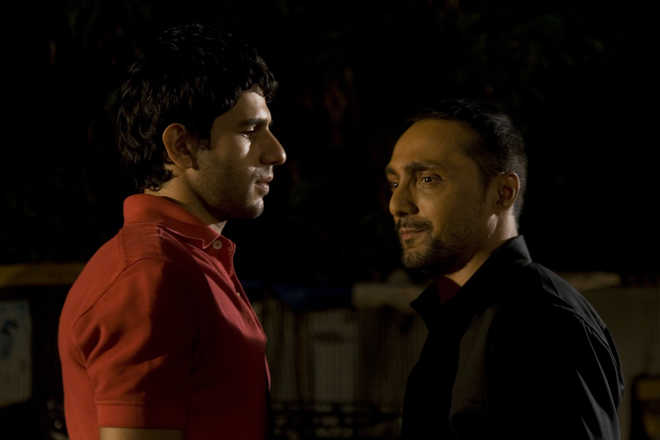L G Singh
In a telling scene from the trailer of filmmaker Hansal Mehta and writer Apurva Asrani’s upcoming real-life drama Aligarh, Rajkummar Rao (playing a journalist) asks Manoj Bajpayee (playing the role of Prof Siras of Aligarh Muslim University, who committed suicide after facing ostracism for being gay), “Did you love him?” Manoj retorts: “Kabhi love ko bhi samajhne ki koshish kiya karo — It’s a beautiful word”.
The film, which follows the tradition of defying gay and lesbian stereotypes in Indian cinema, comes at a time when the Supreme Court has decided to re-examine its judgment on the validity of Section 377 of the Indian Penal Code that criminalises unnatural sex (which by definition includes gay and lesbian sex). While there has been staunch support for the repeal of Section 377 in the civil society and in the mainstream media, Indian cinema has been rather cautious and cagey and has supported the idea, if only, on the fringes. Given that context, a film like Aligarh assumes significance beyond the life journey it aims to chronicle — because at the heart of it, the film is the tragedy of a human heart that wasn’t allowed to love and live the way it willed.
Aligarh, like Onir’s My Brother Nikhil and I Am, challenges the popular portrayal of gay characters in cinema. None of the actors who played gay in these films are/were effeminate, over-the-top or sexually desperate. The issues Onir touched upon and dealt with great sensitivity allowed us a peek into a world of men and women, who aren’t the odd ones out — in terms of mannerism or appearance, and yet who chose to live and love on their own terms, despite the hardships they faced.
Interestingly, 20 years before Aligarh, Deepa Mehta gave us a path-breaking film Fire, where Shabana Azmi and Nandita Das played sisters-in-law, who fall in love. Fire faced mighty protests from right-wing organisations when it hit the theatres. Incidentally, Aligarh hasn’t yet faced any protests and it will be critical to see the reactions to the film once it is released.
Interestingly, none of the top billing Bollywood actors — men and women — have played a gay or a lesbian character yet. To that extent, down south in Malayalam cinema, superstar Prithviraj Sukumaran took the onus and gave a layered performance in his film Mumbai Police. The character of a gay cop that he essayed subscribed to all notions of masculinity, and yet, it embodied the sensitivity the role demanded.
Closer home, John Abraham and Abhishek Bachchan enacted the role of gay characters in Dostana but here the two faked it in order to get close to Priyanka Chopra’s character. In spite of its share of stereotypes, Dostana allowed the discourse to go mainstream because it had three big stars featuring in it. With its own share of cringe worthy moments, the movie brought in the discourse of a parent, a single mother, who eventually accepts his son’s lover — another man. Karan Johar, whose production house Dharma Productions produced Dostana, chose to depict a gay story in Bombay Talkies, an anthology of four short films that coincided with the 100 years of Indian cinema. The characters of Saqib Saleem and Randeep Hooda in his film weren’t effeminate or sexually frustrated.
While there is no denying that an Aligarh will go a mighty long way in creating a room for debate and discussion on whose right is it really to define love and who determines how one should love, Hindi cinema still needs to come out of the closet and take on the mantle to steer the debate and bring the change that is effective and beyond 140 Twitter characters. For once, it will be good to have a gay character that has bulging biceps and a lesbian character with a curvaceous waist. If these are the stereotypes of how straight men and women ought to be, what’s stopping us from making them fall in love with people of same sex! After all just like love, rainbow too is made up of many shades!
Unlock Exclusive Insights with The Tribune Premium
Take your experience further with Premium access.
Thought-provoking Opinions, Expert Analysis, In-depth Insights and other Member Only Benefits
Already a Member? Sign In Now










